| Srl | Item |
| 1 |
ID:
110027
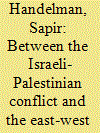

|
|
|
|
|
| Publication |
2012.
|
| Summary/Abstract |
How to create a peacemaking change in the Israeli-Palestinian struggle? The consensus solution to the Israeli-Palestinian conflict is a 'two-state solution', which means separation between two major identity groups. This paper points to the necessity to shift the emphasis in the peacemaking discussion. Instead of manufacturing solutions in a peacemaking laboratory, it would be better to focus on finding the social conditions that have the potential to create an effective peacemaking process. This paper suggests establishing a major Israeli-Palestinian public negotiating congress that has the potential to create a peacemaking revolution. The vision is based on the multi-party talks that had been conducted in Apartheid South Africa and Northern Ireland during the 'troubles' and the Minds of Peace Experiment - a small-scale Israeli-Palestinian public negotiating congress - that has been conducted in various locations around the world.
|
|
|
|
|
|
|
|
|
|
|
|
|
|
|
|
| 2 |
ID:
153234
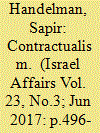

|
|
|
|
|
| Summary/Abstract |
How do we create an effective change in situations of intractable conflict where ordinary people are at the centre of the struggle? Distinguishing between top-down contractualism and bottom-up contractualism, this article presents the South African peace process of the 1990s as an example of top-down contractualism. In contrast, it raises the question as to whether bottom-up peace-making contractualism can emerge in the Israeli–Palestinian case.
|
|
|
|
|
|
|
|
|
|
|
|
|
|
|
|
| 3 |
ID:
153233
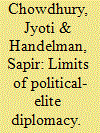

|
|
|
|
|
| Summary/Abstract |
This article challenges the convention that political-elite diplomacy should be the main instrument for coping with difficult violent conflicts. Its main argument is that a multifaceted approach to peace-making that creates equilibrium between political-elite diplomacy and public diplomacy has the greatest potential to generate a positive change in difficult situations of protracted violent conflicts where ordinary citizens are at the centre of the struggle. To demonstrate our central claim, the paper analyses three case studies that are considered to be significant cases within the realm of geopolitics and the history of modern statecraft: the Oslo Accord in the Israeli–Palestinian situation, the Dhaka negotiations that preceded the civil war between East and West Pakistan, and the Mandela–de Klerk interactions that led to a revolutionary transformation in South Africa.
|
|
|
|
|
|
|
|
|
|
|
|
|
|
|
|
| 4 |
ID:
110026
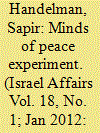

|
|
|
| 5 |
ID:
110028
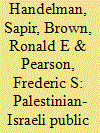

|
|
|
|
|
| Publication |
2012.
|
| Summary/Abstract |
This paper draws lessons from the role played by the black church in creating support for the US civil rights movement in relation to the struggle to involve the Palestinian and the Israeli people directly in the peacemaking efforts to resolve their tragic conflict. The civil rights struggle in both the US and South Africa eventually engaged large segments of the public in both productive debate and campaigning. The corresponding impetus now is to create a major Palestinian-Israeli public negotiating congress that can involve ordinary citizens on both sides in the peacemaking efforts. The Minds of Peace Experiment, a small-scale Palestinian-Israeli public negotiating assembly, is designed to demonstrate the peacemaking power of a subsequent major congress. The exercise, which has been conducted around the US, Canada, and the Middle East, succeeded in creating peacemaking coalitions that are based on commitment to promote the culture of peace. The question is: how can you transform this peacemaking effect into a mass movement? The American black church movement as well as the South African mass mobilization can offer important indications of effective strategy.
|
|
|
|
|
|
|
|
|
|
|
|
|
|
|
|
| 6 |
ID:
143661
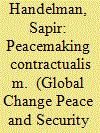

|
|
|
|
|
| Summary/Abstract |
This paper presents a contractual approach to coping with difficult situations of intractable conflict where ordinary citizens are at the center of the struggle. The contractualist peacemaker challenge is to convert conflicting parties into a peacemaking community committed to resolving the conflict by peaceful means. Three main elements are necessary to transform conflicting groups into a peacemaking community: common interest: strong desire to resolve the conflict by peaceful means; rules: commitment to democratic principles of dialogue; and peacemaking institutions: an organizational device that operates and maintains peacemaking communities. A peacemaking institution that has the potential to create momentum for the establishment of a peacemaking community is a major public negotiating congress. An ideal congress invites delegations from all walks of life to negotiate solutions to the conflict. This vision is based on the multi-party talks of the 1990s that helped to create a major change in two difficult situations of intractable conflict: the ‘troubles' in Northern Ireland and the battle against the Apartheid system in South Africa. This paper explores possibilities to establish a major Israeli–Palestinian public negotiating congress.
|
|
|
|
|
|
|
|
|
|
|
|
|
|
|
|
| 7 |
ID:
129046


|
|
|
|
|
| Publication |
2014.
|
| Summary/Abstract |
This article presents a contractualist approach to peace and conflict studies that grows out of classical paradigms in the field. The contractualist approach proposes a solution to intractable conflicts through processes such as a public negotiating congress to transform conflicting parties into a large peacemaking community. The vision of an ideal congress is based on the multi-party talks that had operated in South Africa and Northern Ireland during the 1990s. The challenge is to establish a similar peacemaking institution in cases such as the Israeli-Palestinian dispute where ordinary citizens are at the center of the struggle. This article includes theoretical background, analysis of relevant case studies, and lessons from the Minds of Peace Experiment, a small-scale Israeli-Palestinian public negotiating congress that has held sessions in various locations around the world.
|
|
|
|
|
|
|
|
|
|
|
|
|
|
|
|
| 8 |
ID:
153232


|
|
|
|
|
| Summary/Abstract |
This introductory article describes peace-making, peace-building and peace-keeping according to the specific characterization of the Israeli–Palestinian conflict. It presents the different articles in this special issue according to these categories and discusses critically their main theses. This methodology intends to help us gain a better understanding of the challenge of change.
|
|
|
|
|
|
|
|
|
|
|
|
|
|
|
|
| 9 |
ID:
111571
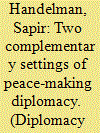

|
|
|
|
|
| Publication |
2012.
|
| Summary/Abstract |
In terms of the question, "how to create an effective peace-making process in the Israeli-Palestinian case," this article argues that the answer is a multidimensional approach to peace-making diplomacy that contains two main settings: political-elite diplomacy and public diplomacy. Political-elite diplomacy suggests various modes of peace-making interactions between political-elites. Public diplomacy provides instruments to involve the people in the peace-making struggle, prepares them for a change, and presses the leadership to reach agreements. The analysis suggests establishing an institution for the operation of public diplomacy-a major Israeli-Palestinian public negotiating congress. The congress is a democratic peace-making institution that invites representatives of the opposing societies to discuss, debate, and negotiate solutions to their struggle. The article also presents the concepts of political-elite diplomacy and public diplomacy as competitive settings that should be regarded as complementary. It includes lessons from the "Minds of Peace Experiment"-a small-scale Israeli-Palestinian public negotiating congress-which has been conducted in different places around the world.
|
|
|
|
|
|
|
|
|
|
|
|
|
|
|
|
| 10 |
ID:
083698
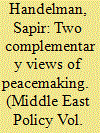

|
|
|